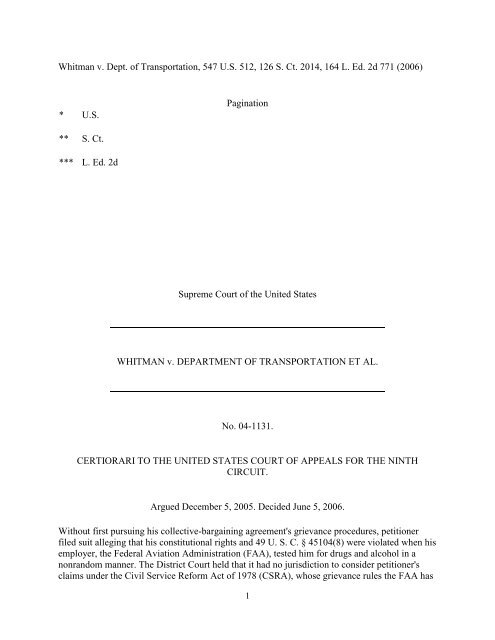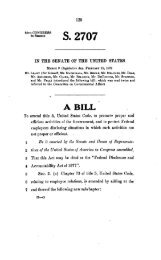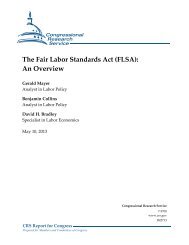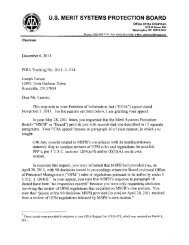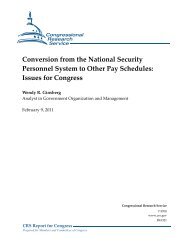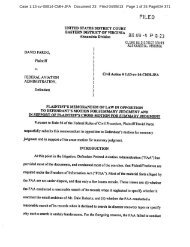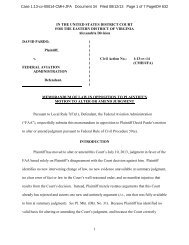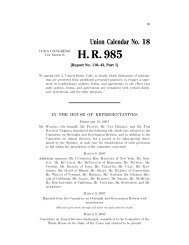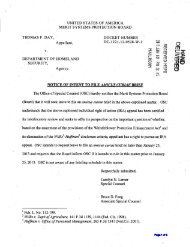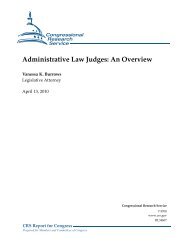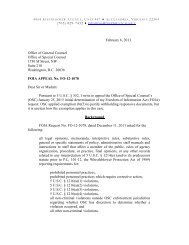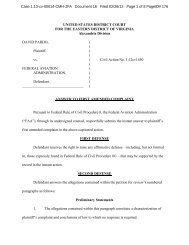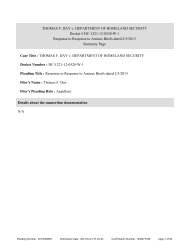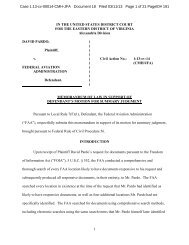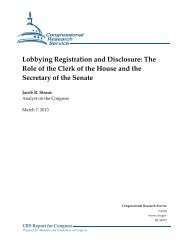Whitman v. Dept. of Transportation, 547 US 512, 126 ... - MSPB Watch
Whitman v. Dept. of Transportation, 547 US 512, 126 ... - MSPB Watch
Whitman v. Dept. of Transportation, 547 US 512, 126 ... - MSPB Watch
- TAGS
- whitman
- transportation
- mspb
Create successful ePaper yourself
Turn your PDF publications into a flip-book with our unique Google optimized e-Paper software.
over "all civil actions arising under the Constitution, laws, or treaties <strong>of</strong> the United States." 28 U.S.C. § 1331. The question, then, is not whether 5 U. S. C. § 7121 confers jurisdiction, butwhether § 7121 (or the CSRA as a whole) removes the jurisdiction given to the federal courts,see Verizon Md. Inc. v. Public Serv. Comm'n<strong>of</strong> Md., 535 U. S. 635, 642 (2002) (holding that"even if [47 U. S. C] § 252(e)(6) does not confer jurisdiction, it at least does not divest thedistrict courts <strong>of</strong> their authority under 28 U. S. C. § 1331 to review the Commission's order forcompliance with federal law"), or otherwise precludes employees from pursuing remediesbeyond those set out in the CSRA, cf. United States v. Fausto, 484 U. S. 439, 443-444 (1988);AbbottLaboratories v. Gardner, 387 U. S. 136, 140 (1967) ("The question is phrased in terms <strong>of</strong>`prohibition' rather than `authorization' because . . . judicial review <strong>of</strong> a final agency action by anaggrieved person will not be cut <strong>of</strong>f unless there is persuasive reason to believe that such was thepurpose <strong>of</strong> Congress").In deciding the question <strong>of</strong> jurisdiction and preclusion, the Court would be required first toascertain where <strong>Whitman</strong>'s claims fit within the statutory scheme, as the CSRA providesdifferent treatment for grievances depending on the nature <strong>of</strong> the claim. It may be, for example,that the FAA's actions, as described by the petitioner, constitute a "prohibited personnelpractice." See 5 U. S. C. § 2302(b); 49 U. S. C. § 40122(g)(2)(A). Both the petitioner and theGovernment say they do not, but because the ultimate question may be jurisdictional, thisconcession ought not to be accepted out <strong>of</strong> hand. See Weinberger v. Bentex Pharmaceuticals,Inc., 412 U. S. 645, 652 (1973) ("Parties, <strong>of</strong> course, cannot confer jurisdiction; only Congresscan do so"). The Court <strong>of</strong> Appeals did not decide whether the petitioner's allegations state a"prohibited personnel practice." The proper course, then, is to remand for the Court <strong>of</strong> Appeals toaddress the matter, see National CollegiateAthletic Assn. v. Smith,[*515]525 U. S. 459, 470 (1999), [***775]as well as the ultimate issue <strong>of</strong> preclusion. The various[**2016]other issues raised before this Court, but not decided below, may also be addressed onremand, including: whether the petitioner has challenged final agency action; whether thepetitioner has exhausted his administrative remedies; whether exhaustion is required given thisstatutory scheme and the Administrative Procedure Act, as interpreted in Darby v. Cisneros, 509U. S. 137 (1993); and whether the Government has forfeited its exhaustion-<strong>of</strong>-remediesargument. It may be that a decision on these questions can obviate the need to decide a moredifficult question <strong>of</strong> preclusion.The judgment <strong>of</strong> the Court <strong>of</strong> Appeals is vacated, and the case is remanded for furtherproceedings consistent with this opinion.It is so ordered.J<strong>US</strong>TICE AUTO took no part in the consideration or decision <strong>of</strong> this case.3


